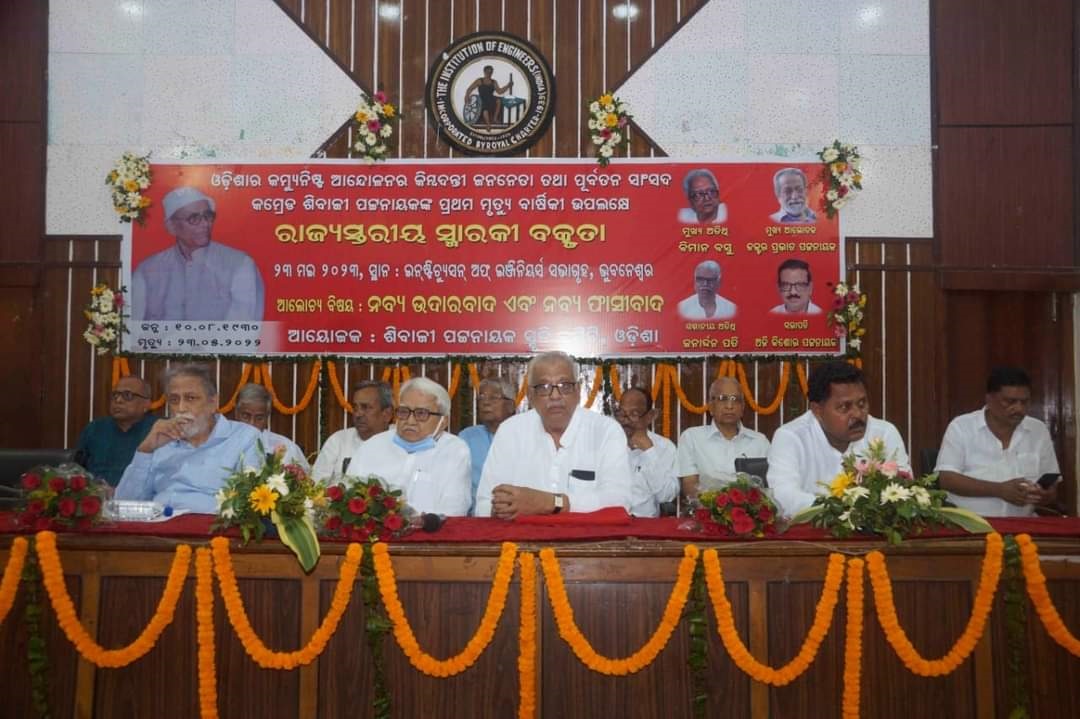
Rabi Narayan Mallick
ON the occasion of the first death anniversary of Sivaji Patnaik, a distinguished person who was a former member of CPI(M) Central Committee, former secretary of CPI(M) Odisha state committee, a former member of Parliament, and a revered Communist leader of Odisha, rich tributes were paid to him in Bhubaneswar on May 23. Biman Basu, a former member of the CPI(M) Polit Bureau and veteran Communist leader, and Professor Prabhat Patnaik, an eminent economist, addressed a packed auditorium at the Engineer's Institute in Bhubaneswar on this momentous occasion.
Biman Basu, while paying tributes, reflected upon the crucial contribution of Sivaji Patnaik in the formation of CPI(M) in Odisha during the post-1964 period. From his early days as a student to his passing away in 2022 at the age of 93, Sivaji Patnaik tirelessly fought for over seven decades in support of the working masses and was a dedicated Marxist.
Delivering the memorial lecture on "Neo-Liberalism and Neo-Fascism” Prabhat Patnaik emphasized the critical importance of defeating both neo-liberalism and its derivative, neo-fascism. It can be made possible by fostering unity and collective effort among all classes of working people and the secular democratic forces.
Patnaik explained the five prevailing features of fascism seen across the world – denial of democracy: fascism inherently rejects democratic principles; authoritarian suppression: in addition to utilising State power to quash dissent, fascism also employs street hoodlums or thugs to attack its opponents; monopoly capitalism and fascism: there exists a close relationship or nexus between monopoly capitalism and fascism; targeting and "othering" of minorities: fascism propagates hatred among the majority by singling out and marginalising minorities based on religion, caste, race, ethnicity, language, and alliance with a new cohort of monopoly capitalists: fascism forms a close alliance with a fresh group of monopoly capitalists.
Neo-fascism intensifies the assault on trade unions, the peasantry, and the petty producers through higher extraction of surplus by diminishing the portion of wages in the overall value created. In its endeavour to divert attention from genuine concerns, fascism manipulates narratives and discourses. Moreover, it aims to fragment the masses and undermine their unity by entangling them in identity politics.
The resolution to the global economic crisis involves a two-pronged approach. Firstly, increasing the fiscal deficit through government investment in the social sector, which can stimulate aggregate demand. Secondly, generating revenue through wealth and inheritance taxes. However, these measures face strong opposition from international finance capital and advocates of neoliberalism. Any nation that dares to pursue this alternative path risks capital flight. While workers face barriers in migrating to other countries, global capital can easily shift investments to low-wage nations like Indonesia, Malaysia, Bangladesh, China, Vietnam, and Taiwan. This practice not only undermines the collective bargaining power of workers in advanced capitalist countries but also suppresses their wages.
Prof. Patnaik highlighted the growing threat of right-wing shifts in various countries such as Italy, Germany, France, the United States, Hungary, Poland, Turkey, Brazil, and more. He emphasized that this phenomenon is a direct result of the ongoing global capitalist crisis, which capitalism in its neoliberal form is unable to effectively address.
In the previous century, fascist Germany and Japan were able to address unemployment crises through the production of war materials, benefiting the United States as it became the largest arms supplier. However, in today's world, the possibility of a full-scale global war is unlikely due to the subdued nature of inter-imperialist rivalries. This stands in contrast to Lenin's characterisation of First World War as a conflict driven by rival imperialist powers seeking to capture markets and resources.
The defeat of neo-fascism and neo-liberalism are intertwined, as evidenced by the triumph of the historic year-long struggle of the farmers. Prof. Patnaik emphasized that only through unified resistance both neo-fascism and neo-liberalism can be defeated. To achieve this, it is essential to transcend neo-liberalism, as a pro-people alternative cannot be realised within its framework.
In his opening remarks, he shared the remarkable legacy of his family's enduring connection with Sivaji Patnaik, highlighting his remarkable contribution to the building and growth of the Communist movement and the people's struggles in Odisha. He regarded Sivaji Patnaik's contributions as truly inspiring and worthy of emulation.
The seminar was presided over by Ali Kishor Patnaik, CPI(M) state secretary, and Janardan Pati, a CPI(M) state secretariat member. In his address, Janardan Pati paid tributes to the selfless sacrifices made by Sivaji Patnaik in fostering the people's movement both within and outside the parliamentary realm. A diverse array of individuals and leaders from Left-wing and democratic parties, intellectuals, retired bureaucrats, students, youth, and workers came together in large numbers to participate in the event.
In the evening on the same day, chief minister of Odisha, Naveen Patnaik, initiated the foundation-laying ceremony for the Sivaji Patnaik Memorial Plaza. The memorial plaza situated in a bustling area of the city, adjacent to the state headquarters of the CPI(M) will be developed by the Bhubaneswar Development Authority (BDA). This initiative aims to acknowledge and honour the selfless service of the legendary Sivaji Patnaik and exhibit his remarkable contributions and the struggles of the working class and peasantry in Odisha.
The foundation laying ceremony witnessed the presence of Biman Basu, Ali Kishor Patnaik, Janardan Pati, and numerous Party comrades, including all the state secretariat members.


